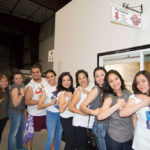
When you aren’t constantly interacting with people of other races and nationalities, you begin to pull references from wherever you can in order to gain a better understanding of them. For most people, that source usually ends up being the media—specifically television and film.
Growing up a Latina, I can tell you we are a pretty diverse group of people. However, the way we are often portrayed in the American culture would have you thinking otherwise.
Seeing how Latinos in general are underrepresented, I appreciated seeing Latinas in the music and television scenes. Watching television, I saw Latina women embodied as “spicy” and “fiery,” whose tiny waists and big breasts were praised for flaunting the body of a “real” woman. So I was proud of the women on magazine covers like Eva Longoria, Sofia Vergara and Jennifer Lopez who became a representation for Latina women.
I then began to recognize the mass stereotypes that the media naturally assigns to Latinas. On the rare chance that we do get representation, it becomes a “one size fits all” narrative.
We are the Eva Mendez’s of the world, the Sofia Vergara’s and the J.LO’s. The spicy Latina women with the big butt and a bigger attitude to match. We’ll swear at you in Spanish while simultaneously making you a big pot of arroz con carne, fetch you Coronas and call you Papi—all while wearing a skimpy red dress.
The problem with this stereotypical representation is it erases our identity as individuals and replaces us with this image of how we are supposed to look and act.
In turn, men (even Latino men) begin to fetishize us and lust after this hyper-sexualized fantasy of a woman that most of us can never live up to.
I am a Latina.
What I am not is someone who wants to be fetishized for this.
It wasn’t up until my teenage years, when I began religiously immersing myself in pop culture, that I started to realize just how damaging and dehumanizing this idea actually was.
It’s important to say that this issue not only affects Latinas but women of color. Racial fetishism minimizes women to just their race and ethnicity, which is constantly seen as part of their sexuality. The media, not surprisingly, often feeds us such obsessions, and it’s manifesting in our social structures.
According to the Center for American Progress, “Only 3 percent of Latina women are represented in science, technology, engineering and mathematics—or STEM fields—while women in total make up 24 percent of the STEM workforce.” Latina women are still being underrepresented and dehumanized.
We need to put a stop to this.
Acknowledge it. Confront it. Don’t do it. Recognize if it’s being done to you.
The spicy Latina is an image I had no part in creating, yet I’m told to fit into this subordinate role. I’m not flattered because I am not your spicy Latina, nor do I ever want to be.



















